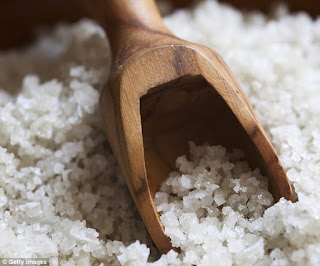Tiny pieces of plastic have been found in sea salt on sale in Europe, US and China
Tiny pieces of plastic have been found in sea salt on sale in Europe, US and China
Sea salt harvested from oceans around the world and a favourite of discerning cooks is contaminated with plastic, scientists have found.
Tiny pieces of the material have been found in sea salt on sale in the UK, Europe, the US and China.
It confirms that plastic litter reaching oceans is being broken down and getting in to our food.
Previous studies have found that fish such as cod, as well as shellfish and crustaceans including scampi caught off the British coast, contain plastic particles.
Researchers believe the majority of the contamination comes from microfibres and single-use plastics such as bottles.
Sherri Mason, a professor at the State University of New York at Fredonia, said: ‘Not only are plastics pervasive in our society in terms of daily use, but they are pervasive in the environment.’ She said plastics are ‘ubiquitous, in the air, water, the seafood we eat, the beer we drink, the salt we use – plastics are just everywhere’.
Professor Mason collaborated with researchers at the University of Minnesota to examine microplastics in salt, beer and drinking water.Her research looked at 12 kinds of salt, including ten sea salts from around the world that are sold in US grocery stores.
Many contained plastic and her findings suggest Americans could be ingesting upwards of 660 particles of plastic every year, according to a draft of her report seen by the Guardian. It is believed that once plastics enter the sea they become a magnet for toxins and pollutants. However, there is an absence of research on the effects of eating them on human health.
Scientists first found plastics in salt in China in 2015. Microscopic particles from face scrubs, cosmetics, and plastic bottles were found in samples of 15 salt products in Chinese grocery stores. Earlier this year, scientists from France, the UK and Malaysia tested 17 types of salt from eight countries. All but one contained tiny plastic particles. Following a Daily Mail campaign, Britain has announced a ban on the use of plastic microbeads in products such as face scrubs.
Environment Secretary Michael Gove is investigating the introduction of a deposit and refund scheme for plastic bottles. Earlier this week, the Scottish Government said it will press ahead with a deposit and refund scheme on bottles in a scheme similar to those operating in Germany and Scandinavia.
Research from the University of Plymouth also found that more than one in three fish caught by trawler in the English Channel, including cod, haddock and mackerel, contained plastic particles.
Meanwhile, studies by experts at the University of Exeter have found that the entire food chain of sea creatures – from zooplankton through to crustaceans or copepods, mussels, crabs, lobster and fish – have effectively become contaminated by microplastics.
himalayan salt, the dead sea, best sea salt spray, sea salts bath, sea salts sigma, harvested from the sea, discover, how sea salt, sea salts benefits, natural science, back to basics, sea salt for dark spots, sea salt toner, sea salt mask, reporting, sea salts,
dangers of table salt, himalayan salt for blood pressue, sea salt vs. regular salt, health benefits of himalayan salt, sodium chloride, health benefits of celtic sea salt, natural remedies, times video, wellness (industry), table salt dangers, sea (geographical feature category), nature (literary genre), natural phenomenon, salt spray for hair, celtic sea salt vs. himalayan salt, newspaper, ingredient (literature subject), unesco world heritage site (natural or cultural site designation),

Comments
Post a Comment